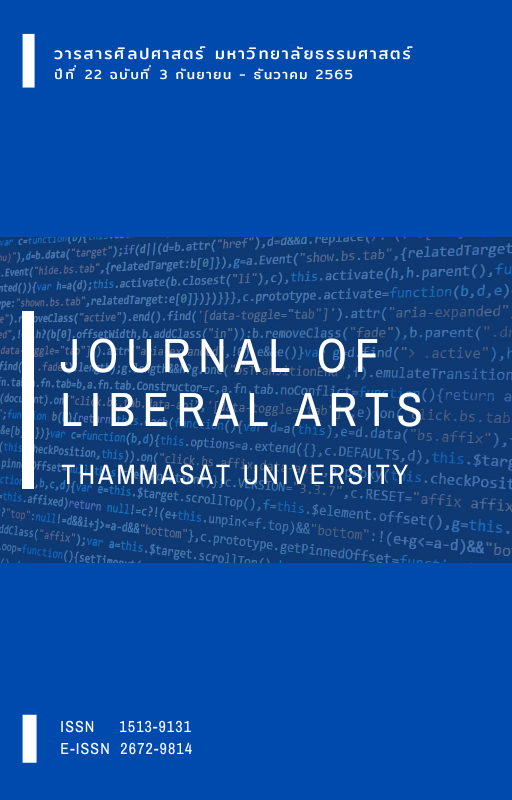ความวิตกกังวลในการเลือกประกอบอาชีพของนักศึกษาระดับปริญญาบัณฑิต สาขาอุตสาหกรรมการท่องเที่ยวและการบริการ
Main Article Content
บทคัดย่อ
บทความวิจัยนี้มีวัตถุประสงค์เพื่อ 1) ศึกษาระดับความวิตกกังวลในการเลือกประกอบอาชีพของนักศึกษา และ 2) เปรียบเทียบระดับความวิตกกังวล ในการเลือกประกอบอาชีพกับปัจจัยทางชีวสังคมของนักศึกษา เครื่องมือวิจัยเป็นแบบสอบถามสำหรับเก็บข้อมูลจากกลุ่มตัวอย่าง คือ นักศึกษาระดับปริญญาบัณฑิต สาขาอุตสาหกรรมการท่องเที่ยวและการบริการ จำนวน 1,301 คน จากการเลือกแบบหลายขั้นตอน วิเคราะห์ข้อมูลด้วยการแจกแจงความถี่ ร้อยละ ค่าเฉลี่ย และส่วนเบี่ยงเบนมาตรฐาน ค่าสถิติทดสอบทีที่เป็นอิสระต่อกัน และการวิเคราะห์ความแปรปรวนหนึ่งทาง ผลการวิจัย มีดังนี้ 1) ระดับความวิตกกังวลในการเลือกประกอบอาชีพของนักศึกษาอยู่ในระดับปานกลาง ( = 3.32, SD = 0.787) และ 2) ปัจจัยทางชีวสังคมของนักศึกษาที่ต่างกันทำให้ความวิตกกังวลในการเลือกประกอบอาชีพแตกต่างกัน (p < 0.01, 0.05)
Downloads
Article Details

อนุญาตภายใต้เงื่อนไข Creative Commons Attribution-NonCommercial-NoDerivatives 4.0 International License.
เอกสารอ้างอิง
ตฏิลา จำปาวัลย์. (2561). ความวิตกกังวลตามสถานการณ์. วารสารพุทธจิตวิทยา, 3(1), 13-20.
นำชัย ชีววิวรรธน์. (2563). COVID-19 โรคระบาดแห่งศตวรรษ. มติชน.
พงษ์มนัส ดีอด. (2563). ผลกระทบของการแพร่ระบาดโรคไวรัสโคโรนา 2019 ต่อการประกอบอาชีพบริการจัดส่งอาหาร. วารสารมหาจุฬานาครทรรศน์, 7(6), 131-144.
ไพรัช วงศ์ศรีตระกูล. (2554). ความเครียดและความวิตกกังวลของนักศึกษามหาวิทยาลัยธนบุรี. วารสารวิชาการมหาวิทยาลัยธนบุรี, 5(9), 19-28.
ระชานนท์ ทวีผล, และ ประสพชัย พสุนนท. (2558). ปัจจัยที่ส่งผลต่อความวิตกกังวลของนักศึกษาสาขาวิชาการจัดการโรงแรม คณะวิทยาการจัดการ มหาวิทยาลัยศิลปากร. วารสารวิทยาศาสตร์และเทคโนโลยี, 23(5), 721-730.
ศูนย์ข้อมูลและข่าวสืบสวนเพื่อสิทธิพลเมือง. (2563). จับตา: ความต้องการแรงงานครึ่งปี 2563 ธุรกิจลดการจ้างงานสูงสุด 75%. https://www.tcijthai.com/news/2020/8/watch/10808
Brown, E. A. (2011). Hospitality management graduates' perceptions of career factor importance and career factor experience and the relation with turnover intentions [Unpublished doctoral dissertation]. Iowa State University.
Cronbach, L. J. (1990). Essential of psychological testing. Harper & Row.
Dawood, E., Al Ghadeer, H., Mitsu, R., Almutary, N., & Alenezi, B. (2016). Relationship between test anxiety and academic achievement among undergraduate Nursing students. Journal of Education and Practice, 7(2), 57-65.
El-Dief, M., & El-Dief, G. (2019). Factors affecting undergraduates' commitment to career choice in the hospitality sector: Evidence from Saudi Arabia. Journal of Human Resources in Hospitality and Tourism, 18(1), 93-121.
Faul, F., Erdfelder, E., Buchner, A., & Lang, A. G. (2009). Statistical power analyses using G* Power 3.1: Tests for correlation and regression analyses. Behavior Research Methods, 41(4), 1149-1160.
Lu, Y. C. (2016). The relationships among college students’ work values, career anxiety, and career adaptability [Master’s thesis]. National Taichung University of Education. http://ndltd.ncl.edu.tw/handle/38382915542756548708
Mahmoud, J., Staten, R., Lennie, T., & Hall, L. (2015). The relationships of coping, negative thinking, life satisfaction, social support, and selected demographics with anxiety of young adult college students. Journal of Child and Adolescent Psychiatric Nursing, 28(2), 97-108.
Oladipo, S. E., Ogungbamila, A. B., & Idemudia, E. S. (2015). Age and gender factors of test anxiety among undergraduate students in two southwestern Nigerian universities. Gender & Behaviour, 13(2), 6737-6741.
Rathnayake, S., & Ekanayaka, J. (2016). Depression, anxiety and stress among undergraduate nursing students in a public university in Sri Lanka. International Journal of Caring Sciences, 9(3), 1020-1032.
Rovinelli, R. J., & Hambleton, R. K. (1977). On the use of content specialists in the assessment of criterion-referenced test item validity. Tijdschrift voor Onderwijsresearch, 2(2), 49-60.
Shin, Y., & Lee, J. (2019). Self-focused attention and career anxiety: The mediating role of career adaptability. Career Development Quarterly, 67(2), 110-125.
Stefanescu, A. N. (2012). Choice of tourism and hospitality as a study programme and a career path: Analysis of the master students' motivations, expectations and perceptions [Master’s thesis]. University of Ljubljana. http://www.cek.ef.uni-lj.si/magister/stefanescu924-B.pdf
Tsai, C, T., Hsu, H., & Hsu, Y. C. (2017). Tourism and hospitality college students’ career anxiety: Scale development and validation. Journal of Hospitality & Tourism Education, 29(4), 158-165.
Wang, Y. F., Chiang, M. H., & Lee, Y. J. (2014). The relationships among the intern anxiety, internship outcomes, and career commitment of hospitality college students. Journal of Hospitality, Leisure, Sport and Tourism Education, 15, 86-93.
Xiao, X. (2012). Career behaviors of tourism management students in China [Unpublished master thesis]. Kent State University.
Yilmaz, F. N., & Gunduz, H. C. (2018). Career indecision and career anxiety in high school students: An investigation through structural equation modeling. Eurasian Journal of Educational Research, 78, 23-42.


